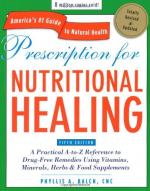|
This section contains 749 words (approx. 3 pages at 300 words per page) |

|
Vitamins are organic compounds that the human body needs in order to function properly and maintain overall good health. Of the 13 compounds currently classified as vitamins, almost all are acquired from dietary sources. A small number, however--including biotin and vitamin K--are at least partially synthesized by the body itself.
Vitamins are generally divided into two groups: fat-soluble vitamins, A, D, E and K; and water-soluble vitamins, B (actually, a group of eight similar compounds, among them thiamine, riboflavin and folic acid) and C. Although vitamins are not all chemically related, they share the same basic purpose: to help regulate the metabolic processes by which the body converts food into energy and living tissues.
Most of the vitamins accomplish this by acting as enzymes—that is, as catalytic proteins that can alter molecules and cause chemical reactions while remaining unchanged themselves. Several of the vitamins, however--including all those...
|
This section contains 749 words (approx. 3 pages at 300 words per page) |

|


